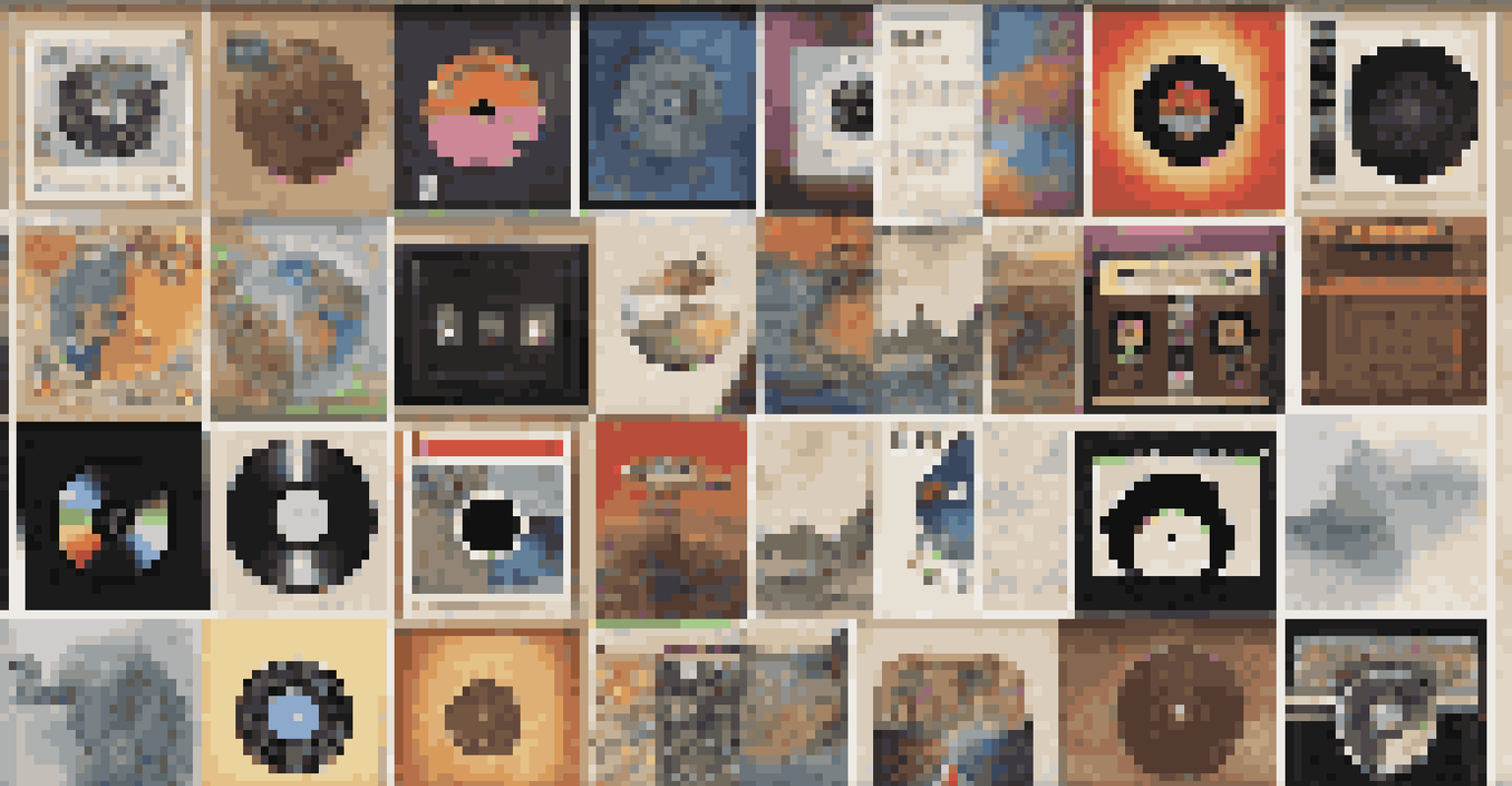The Impact of Music Technology on Cultural Identity: Ethics

Understanding Cultural Identity in the Music Landscape
Cultural identity refers to the sense of belonging to a group that shares common traditions, values, and expressions. In music, this identity is often reflected in the styles, instruments, and lyrics that resonate with specific communities. As music technology evolves, it can both preserve and transform these cultural expressions, leading to new interpretations that may or may not align with traditional values.
Music can change the world because it can change people.
For instance, think about how indigenous cultures have used technology to record and distribute their music globally. While this offers a platform for broader recognition, it also raises questions about authenticity and ownership. Are these communities maintaining their cultural integrity, or are they adapting to fit a commercial mold shaped by technological advances?
Thus, the intersection of music technology and cultural identity is a complex web where preservation meets innovation. Understanding this relationship is crucial for navigating the ethical considerations that arise as we move forward into an increasingly digital music landscape.
The Role of Technology in Music Creation and Distribution
Advancements in music technology have revolutionized how artists create and share their music. Digital audio workstations (DAWs), online streaming platforms, and social media have democratized music production, allowing anyone with a computer and internet connection to become a content creator. This shift has blurred the lines between professional and amateur musicians, fostering a vibrant ecosystem of diverse sounds and styles.

However, with this newfound accessibility comes the challenge of cultural appropriation. Artists may unintentionally borrow elements from cultures that are not their own, leading to debates about respect and ethics. For instance, when a pop artist incorporates traditional African rhythms, they may gain commercial success, but this raises questions about whether they are honoring the culture or exploiting it for profit.
Cultural Identity in Music
Cultural identity is reflected in music through shared traditions and values, which can be both preserved and transformed by technology.
Navigating these waters requires a delicate balance between inspiration and appropriation. Artists must be mindful of their influences and consider the implications of their work on the cultural identities they draw from.
Ethical Considerations in Sampling and Remixes
Sampling and remixing are integral to modern music production, enabling artists to build upon existing works. While this practice can foster creativity, it also raises ethical concerns regarding intellectual property and cultural respect. When an artist samples a track without permission, it not only infringes on copyright but can also displace the original artist's cultural significance.
The power of music makes all the difference in the world.
For example, consider the controversy surrounding the sampling of traditional music in hip-hop. While it can celebrate and highlight cultural heritage, it can also dilute the original meaning or context behind the music. This duality presents a challenge for artists who wish to honor the source material while creating something fresh and innovative.
To navigate these ethical dilemmas, musicians should seek permissions, provide credit, and engage with the cultures they draw inspiration from. This approach not only fosters respect but also enriches the musical landscape by creating authentic connections.
Globalization and the Homogenization of Music
Globalization has facilitated the spread of music across borders, allowing diverse genres to intermingle and evolve. While this has led to exciting fusions and collaborations, there's a concern that it may contribute to the homogenization of music. As mainstream sounds dominate the airwaves, unique cultural expressions risk being overshadowed or lost entirely.
Imagine a world where the rich diversity of musical styles from around the globe is replaced by a handful of popular genres. This scenario highlights the importance of preserving cultural identities in the face of globalization. It's crucial for artists and listeners alike to support and celebrate local music scenes to ensure their survival.
Ethics of Sampling and Remixes
Sampling and remixing raise ethical concerns about intellectual property and cultural respect, highlighting the need for artists to honor source material.
Additionally, technology can play a vital role in preserving these unique sounds. By utilizing digital platforms to promote local artists, we can create a more diverse musical landscape that honors cultural identities rather than diluting them.
Social Media's Influence on Cultural Identity and Music
Social media platforms have become powerful tools for artists to connect with audiences and share their cultural narratives. By showcasing their music and stories, musicians can assert their cultural identity while fostering a sense of community. This direct engagement allows for a more authentic representation of their cultural heritage.
However, the algorithms that govern social media can also narrow our exposure to diverse content. When platforms prioritize certain types of music based on engagement metrics, they risk sidelining lesser-known artists who represent unique cultural identities. This creates an echo chamber that may reinforce stereotypes and limit cultural diversity.
To counteract this, listeners can actively seek out and support artists from varied backgrounds. By doing so, we contribute to a more inclusive music landscape that honors the rich tapestry of cultural identities.
The Impact of Music Technology on Cultural Preservation
Music technology has the potential to play a significant role in preserving cultural heritage. Digital archiving, for example, allows traditional music to be recorded and made accessible for future generations. This preservation is particularly vital for endangered cultures that may not have the resources to document their musical practices.
However, the act of preservation can also lead to commodification, where cultural expressions are packaged for mass consumption. This raises ethical questions about who controls the narrative and how these preserved elements are used. Are they being celebrated for their cultural significance, or merely repackaged for profit?
Globalization's Impact on Diversity
While globalization fosters musical fusion, it also risks homogenizing unique cultural expressions, making it crucial to support local music scenes.
To navigate these challenges, it's essential for communities to take an active role in the preservation process. By collaborating with technologists and musicologists, they can ensure that their cultural identities are represented authentically and respectfully in the digital realm.
Future Directions: Balancing Innovation and Cultural Respect
As music technology continues to evolve, the challenge will be finding a balance between innovation and cultural respect. Artists are encouraged to embrace new tools while being mindful of the cultural contexts in which they operate. This requires an ongoing dialogue about the ethical implications of their choices and the impact on cultural identities.
Furthermore, education plays a crucial role in fostering awareness around these issues. By discussing the importance of cultural sensitivity and ethical practices in music production, we can cultivate a generation of artists who are not only innovative but also conscientious.

Ultimately, the future of music technology should celebrate diversity and inclusivity, ensuring that all cultural identities are honored and respected. As we harness the power of technology, we must also commit to ethical practices that uplift and preserve the rich tapestry of global music.